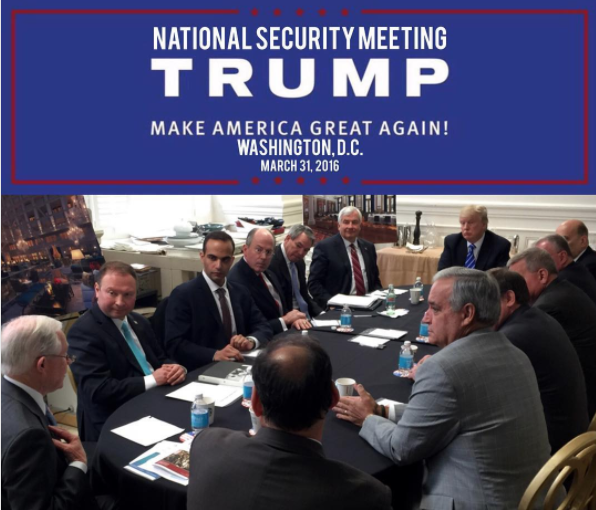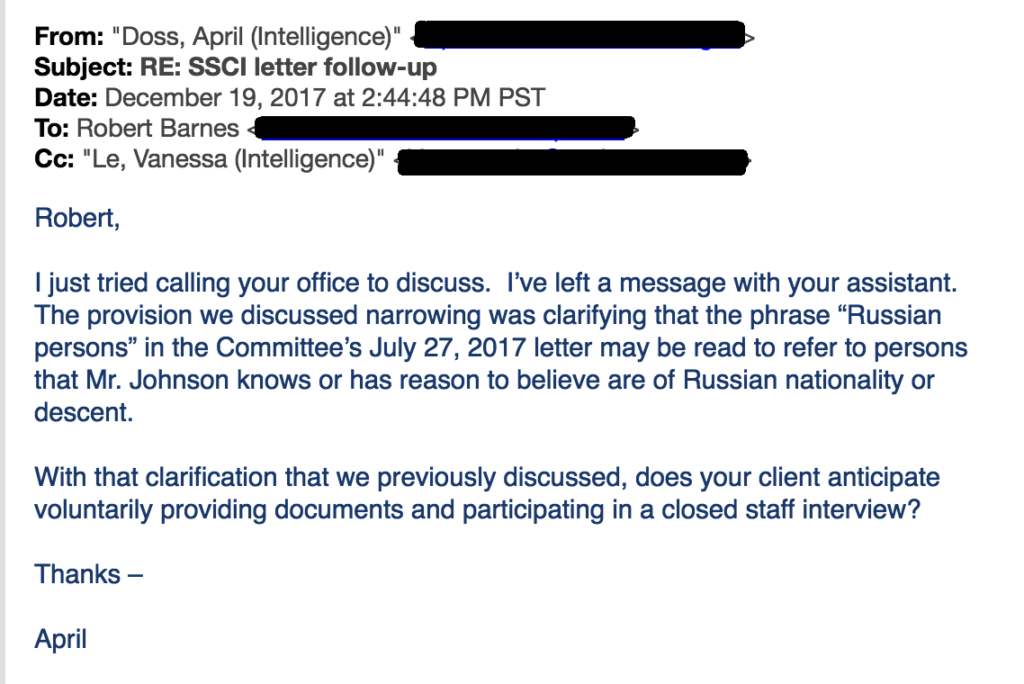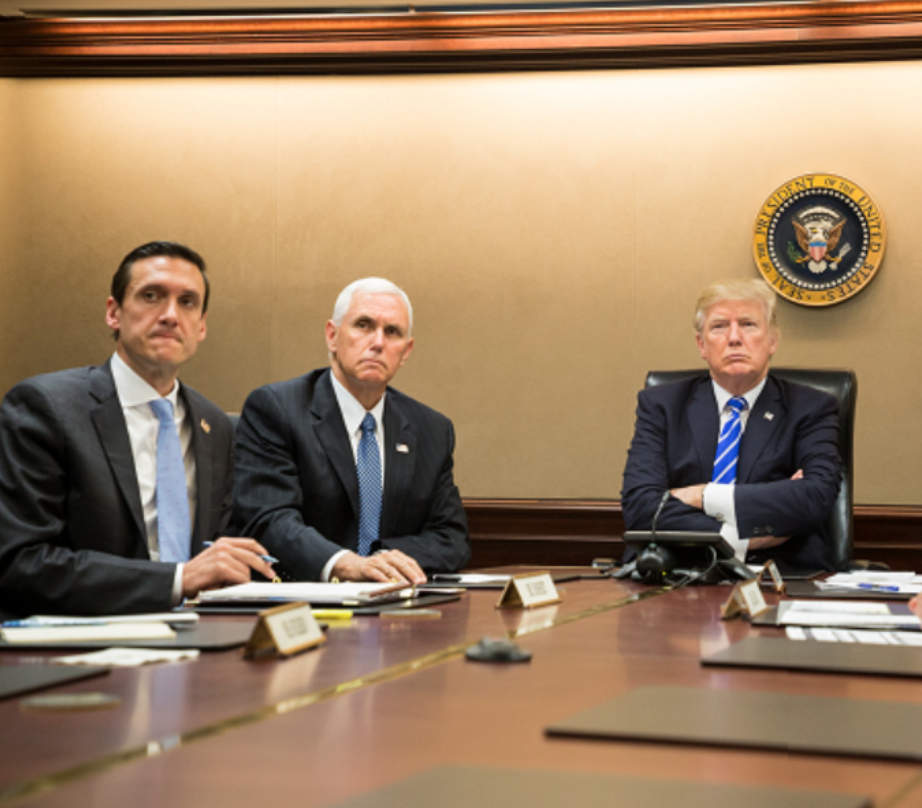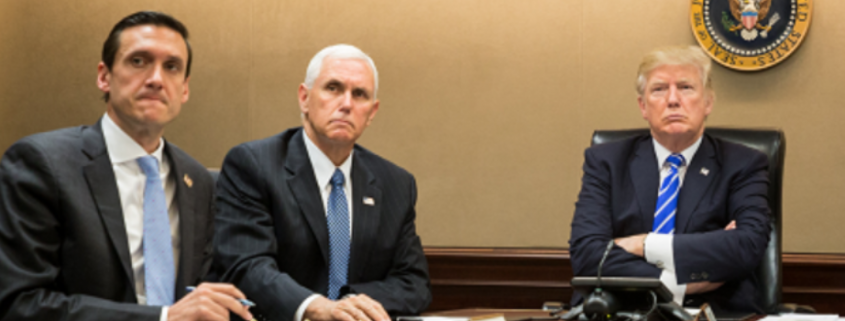The Papadopoulos Delay
We now know that sometime after July 22, 2016, Australian Ambassador to the US, Joe Hockey, told the FBI that George Papadopoulos got drunk with Australia’s Ambassador to the UK, Alexander Downer, two months earlier and told him he had learned the Russians had dirt, emails, on Hillary Clinton.
That revelation has led a lot of people to ask why it took so long — January 27, 2017 — for the FBI to interview Papadopoulos.
I don’t have an answer for that. But I want to point to some dates from his arrest affidavit and information that are newly of interest giving that timing.
As numerous people have pointed out, those documents provide the outlines of the dates when FBI first interviewed Papadopoulos, on January 27, when they had a follow-up interview, on February 16, and when, the day after, he deleted his Facebook account. The follow-up would have happened in the wake of FBI interviewing Joseph Mifsud while he was in the US for the Global Ties conference on February 8. They didn’t arrest Papadopoulos until July 27, roughly a year after the Australians first informed the FBI that he had foreknowledge of what may have been the hacked emails.
But I’m at least as interested in how the other dates from the documents on Papadopoulos relate to that timeline as laid out in the two timelines below.
Note that every Facebook message is to Ivan Timofeev — a legal target under 702. Even in the July arrest affidavit, some emails between Americans are cited. Thus, the need for the warrant.
Importantly, there are no texts cited, at all. In the arrest affidavit, just Papadopoulos’ shutdown of his Facebook account is mentioned. The information explains that, “On or about February 23, 2017, defendant PAPADOPOULOS ceased using his cell phone number and began using anew number.” Whatever texts he might have had on his phone (including more secure Signal texts) would have been destroyed. While Papadopoulos wasn’t using particularly good operational security (particularly in that he was communicating with Timofeev over a PRISM provider), it is possible that the most sensitive communications with the Trump campaign involved texts that got destroyed after his first interview with the FBI.
My guess is that the FBI didn’t start pursuing warrants against Papaopoulos until after that first interview (remember, he remained involved with Trump up until he wasn’t given the energy portfolio on the National Security Council). It’s possible, too, they used FISA orders at first (which would take some time to obtain, unless they got emergency ones), then obtained search warrants to parallel construct the evidence.
“Emails obtained through a judicially authorized search warrant”
March 24, Papadopoulos to campaign
Papadopoulos: “just finished a very productive lunch with a good friend of mine, [Mifsud] . . . ‐ who introduced me to both Putin’s niece and the Russian Ambassador in London ‐ who also acts as the Deputy Foreign Minister.”
“The topic of the lunch was to arrange a meeting between us and the Russian leadership to discuss U.S.-Russia ties under President Trump. They are keen to host us in a ‘neutral’ city, or directly in Moscow. They said the leadership, including Putin, is ready to meet with us and Mr. Trump should there be interest. Waiting for everyone’s thoughts on moving forward with this very important issue.”
Early April: Papadopoulos writes multiple emails about his “outreach to Russia.”
April 10, Papadopoulos to Olga Vinogradova
“We met with [Mifsud] in London. The reason for my message is because [Mifsud] sent an email that you tried contacting me.”
“it would be a pleasure to meet again. If not, we should have a call and discuss some things.”
April 11:
Vinogradova: “now back in St. Petersburg” but would be “very pleased to support your initiatives between our two countries and of course I would be very pleased to meet you again.”
Papadopoulos, cc’ing Mifsud: “I think a good step would be for me to meet with the Russian Ambassador in London sometime this month” would “like to discuss with him, or anyone else you recommend, about a potential foreign policy trip to Russia.”
Mifsud: “This is already been agreed. I am flying to Moscow on the 18th for a Valdai meeting, plus other meetings at the Duma.”
Vinogradova: “I have already alerted my personal links to our conversation and your request. . . . As mentioned we are all very excited by the possibility of a good relationship with Mr. Trump. The Russian Federation would love to welcome him once his candidature would be officially announced.”
April 12, Vinogradova to Papadopoulos:
I have already alerted my personal links to our conversation and your request. The Embassy in London is very much aware of this. As mentioned we are all very excited by the possibility of a good relationship with Mr. Trump. The Russian Federation would love to welcome him once his candidature would be officially announced.”
April 18, Mifsud to Papadopoulos, cc’ed to Ivan Timofeev
“long conversation in Moscow with my dear friend [Timofeev] . . . about a possible meeting between the two of you. [Timofeev] is ready to meet with you in London (orUSA or Moscow). I am putting the two of you in touch to discuss when and where this potential meeting can actually take place.”
April 18, Papadopoulos to Timofeev
“try and come to Moscow,” sets up Skype call for 3PM Moscow time
April 22, Timofeev to Papadopoulos
Thanks him “for an extensive talk!” and proposing “to meet in London or Moscow”
April 22, Papadopoulos to Timofeev:
Suggests “we set one up here in London with the Ambassador as well to discuss a process moving forward.”
April 25, Papapopoulos to Stephen Miller
“The Russian government has an open invitation by Putin for Mr. Trump to meet him when he is ready []. The advantage of being in London is that these governments tend to speak a bit more openly in ‘neutral’ cities.”
April 26: Papadopoulos learns of the “dirt” in the form of emails
April 27, Papadopoulos to Miller
“Have some interesting messages coming in from Moscow about a trip when the time is right.”
April 27: Papadopoulos to Corey Lewandowski
“to discuss Russia’s interest in hosting Mr. Trump. Have been receiving a lot of calls over the last month about Putin wanting to host him and the team when the time is right.”
April 27: Papadopoulos authored speech that he tells Timofeev is “the signal to meet“
April 29:
Papadopoulos “I am now in the process of seeing if we will come to Russia. Do you recommend I get in touch with a minister or embassy person in Washington or London to begin organizing the trip?”
Vinogradova: “I think it would be better to discuss this question with [Mifsud].”
Papadopoulos: “0k. I called him.”
April 30, Papadopoulos to Mifsud:
Thanks for the “critical help” in arranging a meeting between the Campaign and the Russian government
“It’s history making if it happens.”
May 4 [this gets forwarded to Lewandowski, Clovis, and Manafort by May 21]:
Timofeev to Papadopolous “just talked to my colleagues from the MFA. [They are] open for cooperation. One of the options is to make a meeting for you at the North America Desk, if you are in Moscow.”
Papadopolous to Timofeev: “Glad the MFA is interested.”
May 4, Papadopoulos to Lewandowski (forwarding Timofeev email):
“What do you think? Is this something we want to move forward with?”
May 5: Papadopoulos has a conversation with Sam Clovis, then forwards Timofeev email, with header “Russia updates.”
May 8, Timofeev to Papadopoulos:
Emails about setting Papadopoulos up with the “MFA head of the US desk.”
May 13, Mifsud to Papadopoulos:
“an update” of what they had discussed in their “recent conversations,” including: “We will continue to liaise through you with the Russian counterparts in terms of what is needed for a high level meeting of Mr. Trump with the Russian Federation.”
May 14, Papadopoulos to Lewandowski:
“Russian govemment[] ha[s] also relayed to me that they are interested in hostingMr. Trump.”
May 21, Papadopoulos to Paul Manafort, forwarding May 4 email:
“Request from Russia to meet Mr. Trump”
“Regarding the forwarded message, Russia has been eager to meet Mr. Trump for quite some time and have been reaching out to me to discuss.”
May 21, Manafort forwards Papadopoulos email to Rick Gates:
“Lets discuss. We need someone to communicate that DT is not doing these trips. It should be someone low level in the campaign so as not to send any signal.”
June 1: Papadopoulos to Clovis, after having been told Clovis was “running point” by Lewandowski
“Re: Messages from Russia”: “I have the Russian MFA asking me if Mr. Trump is interested in visiting Russia at some point. Wanted to pass this info along to you for you to decide what’s best to do with it and what message I should send (or to ignore).”
June 9: Trump Tower meeting
June 15: Guccifer 2.0 starts releasing emails
June 19: Papadopoulos to Lewandowski
“New message from Russia”: “The Russian ministry of foreign affairs messaged and said that if Mr. Trump is unable to make it to Russia, if a campaign rep (me or someone else) can make it for meetings? I am willing to make the trip off the record if it’s in the interest of Mr. Trump and the campaign to meet specific people.”
July 14, 2016, Papadopoulos to Timofeev:
Proposes “meeting for August or September in the UK (London) with me and my national chairman, and maybe one other foreign policy advisor and you, members of president putin’s office and the mfa to hold a day of consultations and to meet one another. It has been approved from our side.”
August 15, Clovis to Papadopoulos
“I would encourage you” and another foreign policy advisor to the Campaign to “make the trip[], if it is feasible.”
Facebook messages “obtained through a judicially authorized search warrant”
July 15:
Papadopoulos: “We can chat on this, this weekend if you can’t tonight.”
July 21, Papadopoulos to Timofeev:
“How are things [Timofeev]? Keep an eye on the speech tonight. Should be good.”
July 22: Wikileaks starts releasing DNC emails
July 22, Papadopoulos to Timofeev [Particularly given NYT’s confirmation they spent a lot of time together, I wonder if this is about Sergei Millian?]:
“If you know any background of him that is noteworthy before I see him, kindly send my way.”
October 1, Papadopoulos sends a link to this Interfax article.









